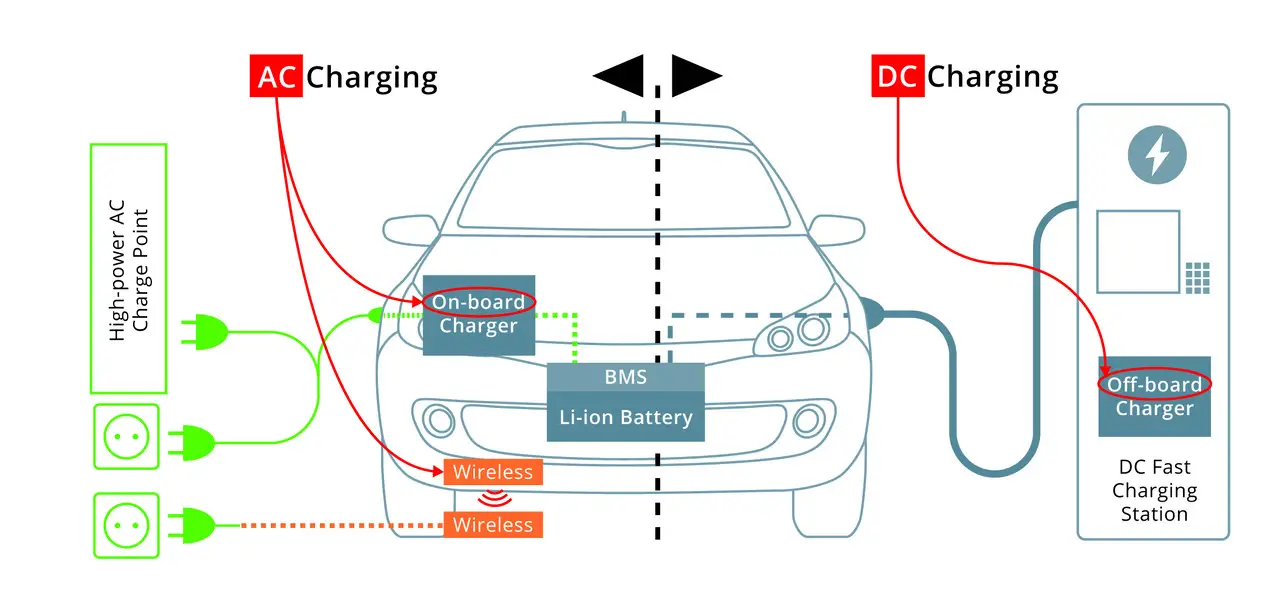When it comes to charging EV vehicles there are two different types of charging facility available in the market, one is DC charging and the other one is AC charging. While at home, we mostly use AC charging and at fast charging kiosks, we use DC charging.
There is a significant difference between AC charging vs DC charging and in this article, we will try to understand those differences.
Before we get into the differences between AC charging vs DC charging, we need to understand what is AC and what is DC. How do both types of charging affect the batteries, which charging method is faster? We will get to know about all these in this article.
What Is AC Current?
AC means Alternating current. An alternating current is an electric current that periodically reverses direction and changes its magnitude continuously with time.
The waveform of alternating current is a sine wave, whose positive half-period corresponds with the positive direction of the current and vice versa.
The beauty of AC is that the voltage can be reduced or amplified using a step-up or a step-down transformer. That is it is easy to transport AC from the powerplant to the grid and from the grid to the household.
In the household, we use AC, but most of our appliances and gadgets use only DC. The charger through which we charge our cellphones, appliances, or gadgets converts the AC to DC and feeds it to the device. So basically those chargers are AC to DC converters.

What Is DC Current
DC always moves in a straight line in the waveform graph. It is usually generated from renewable energy sources like solar panels.
DC power can be converted to AC power using a rectifier. A converter is used to convert the AC power to DC power. For EV fast charging stations, High Voltage DC (HVDC) is used where the voltage range is between 400V-1000V.

AC Charging Vs DC Charging For Electric Vehicles
Electrical Vehicle batteries can take only DC. Most electric vehicle has an inbuilt converter to convert AC to DC.
When you charge EVs at home, you are supplying AC to the converter and the converter then converts the AC to DC and charges the battery.
On the flip side, DC does not need any converter. When you do DC fast charging, the charger bypasses the converter and directly charges the battery. The Battery Management System of the vehicle controls the voltage, current, and temperature of the DC.
Since DC charging does not need a converter like AC charging, it is usually faster than AC charging. DC fast charging station can not be installed at home as our domestic connection can not take the extreme voltage of DC.
For DC charging you need expensive equipment and a high voltage connection to the grid. That is why it is ideal for commercial purposes only where you need to pay to get your vehicle fast-charged. Usually, DC charging can charge your battery within an hour or two based on the power rating of the charging station.
Since DC charging works in a high voltage range, you might be wondering if it could be bad for batteries. But it is not. Regular DC charging is not bad, although the battery degradation will be a little more than AC charging. Usually, it would be around 5% more than AC charging.

Conclusion: AC Charging Vs DC Charging
AC charging takes 6-7 hours to charge a battery to 80% whereas DC charging takes hardly about an hour to charge. That’s a huge difference.
It is advisable to use DC charging whenever possible because that will save charging time, however, keep in mind that you need to spend some more money for DC charging and your battery will degrade a little faster than AC charging.
If you are happy with overnight slow charging, then charging at home with an AC charger is the best option for both cost points of view and battery life.
What Is The Difference Between AC And DC Chargers?
The main difference between AC chargers and DC chargers is that an AC charger uses a converter to convert AC to DC whereas a DC charger does not need a converter.
Why Is DC Charging Faster Than AC?
DC does not need a converter to convert AC to DC as the conversion is done at the charging station itself. The reduction of this additional conversion step makes DC charging way faster than AC charging.